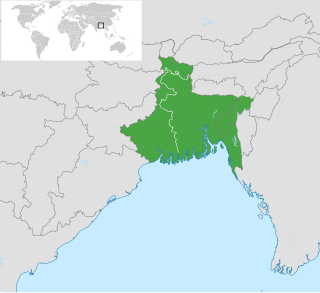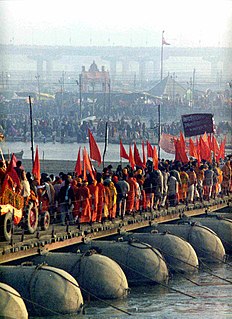
Nightwish is a symphonic metal band from Kitee, Finland. The band was formed in 1996 by lead songwriter and keyboardist Tuomas Holopainen, guitarist Emppu Vuorinen, and former lead singer Tarja Turunen. The band soon picked up drummer Jukka Nevalainen, and then bassist Sami Vänskä after the release of their debut album, Angels Fall First (1997). In 2001, Vänskä was replaced by Marco Hietala, who also took over the male vocalist role previously filled by Holopainen or guest singers.

Bangladesh claims some of the most renowned singers, composers and producers in South Asia. Bangladeshi music spans a wide variety of styles. Music has served the purpose of documenting the lives of the people and was widely patronized by the rulers. It comprises a long tradition of religious and regular song-writing over a period of almost a millennium.
Music of Nepal refers to the various musical genres played and listened to in Nepal. With more than fifty ethnic groups, the music of Nepal is highly diverse. Genres like Tamang Selo, Dohori, Adhunik Geet, Bhajan, Filmi music, Ghazal, Classical music, and Ratna music are widely played and popular, but many other less common genres are yet to be cataloged. Western musical genres like Rock, Metal, Hip-Hop, Rap, R&B also regularly feature on the Nepalese music charts. Most of the country's musical bands are based in the Kathmandu valley. Musical genres from Tibet and India have greatly influenced Nepalese music.
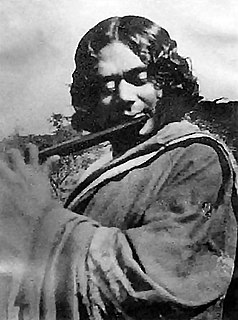
Kazi Nazrul Islam was a Bengali poet, writer, musician, and revolutionary from Bengal. He is the national poet of Bangladesh. Popularly known as Nazrul, he produced a large body of poetry and music with themes that included religious devotion and rebellion against oppression. Nazrul's activism for political and social justice earned him the title of "Rebel Poet". His compositions form the avant-garde genre of Nazrul Sangeet. Nazrul and his works are equally commemorated and celebrated in Bangladesh and India, particularly in India's Bengali-speaking states such as West Bengal, parts of Assam, and Tripura.
Kannada, is the language spoken in Karnataka. Karnataka has eight Jnanapeeth award winners, the highest honor bestowed for Indian literature. From the period of Adikavi Pampa, who proclaimed his wish to be reborn as a little bee in the land of Kannada, Kannada poetry has come a long way to Kuvempu and Dattatreya Ramachandra Bendre.

Bengali music comprises a long tradition of religious and secular song-writing over a period of almost a millennium. Composed with lyrics in the Bengali language, Bengali music spans a wide variety of styles.

Tarja Soile Susanna Turunen-Cabuli, known professionally as Tarja Turunen or simply Tarja, is a Finnish singer-songwriter. She is a lyric soprano and has a vocal range of three octaves.

Rabindra Sangeet, also known as Tagore Songs, are songs from the Indian subcontinent written and composed by the Bengali polymath Rabindranath Tagore, winner of the 1913 Nobel Prize in Literature. Tagore was a prolific composer with around 2,230 songs to his credit. The songs have distinctive characteristics in the music of Bengal, popular in India and Bangladesh.

Sadhak Rāmprasād Sen was a Hindu Shakta poet and saint of eighteenth century Bengal. His bhakti poems, known as Ramprasadi, are still popular in Bengal—they are usually addressed to the Hindu goddess Kali and written in Bengali. Stories of Ramprasad's life typically include legends and myths mixed with biographical details.

Indian folk music is diverse because of India's vast cultural diversity. It has many forms including bhangra, lavani, dandiya, Sufi folk rock, and Rajasthani.
Sufi music is the devotional music of the Sufis, inspired by the works of Sufi poets, like Rumi, Hafiz, Bulleh Shah, Amir Khusrow and Khwaja Ghulam Farid.

Dhupgiri is a city and a municipality of Jalpaiguri district in West Bengal, India.
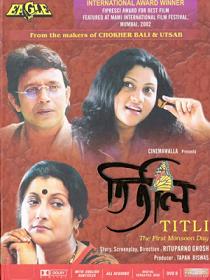
Titli "butterfly") is a 2002 Bengali film by Rituparno Ghosh, starring Konkona Sen Sharma, Aparna Sen, Mithun Chakraborty. The film tells the story of a developing adolescent, played by Konkona, and the sensitivity of a teenager, and also the portrayal of the mother-daughter relationship and quiet understanding within the pair. Titli also means butterfly in Hindi.

The Culture of Bengal encompasses the Bengal region of South Asia, including Bangladesh and the Indian states of West Bengal, Tripura and Assam's Barak Valley, where the Bengali language is the official and primary language. Bengal has a recorded history of 1,400 years. The Bengali people are its dominant ethnolinguistic tribe. The region has been a historical melting point, blending indigenous traditions with cosmopolitan influences from Ancient Indian empires. Bengal was the richest part of Medieval India and hosted the subcontinent's most advanced political and cultural centers during the British Raj.

Nabanna is a Bengali harvest celebration usually celebrated with food and dance and music in Bangladesh and in the Indian State of West Bengal. It is a festival of food; many local preparations of Bengali cuisine like pithe are cooked and offered.

Max Lilja is a Finnish cello player. He is best known for as a founding member of the Finnish cello metal band Apocalyptica, a band he left in 2001 to join the Finnish thrash metal band Hevein. Beginning in 2007, Lilja has been a recording and touring member of Tarja Turunen's solo band. Throughout his career, Lilja has continued to play classical music alongside rock, metal, and crossover projects.

Shyama Sangeet is a genre of Bengali devotional songs dedicated to the Hindu goddess Shyama or Kali which is a form of supreme universal mother-goddess Durga or parvati. It is also known as Shaktagiti or Durgastuti.
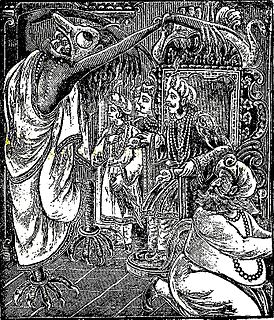
Ghosts are an important part of folklore, and form an integral part of the socio-cultural beliefs of the people living in the geographical and ethno-linguistic region of Bengal, which today consists of the independent nation of Bangladesh, and the Indian states of West Bengal. Fairy tales, both old and new, often use the concept of ghosts. In modern-day Bengali literature, cinema and also in radio & television media, the references to ghosts are often found. There are also many alleged haunted sites in this region. It is believed that the spirits of those who cannot find peace in the afterlife or die unnatural deaths remain on Earth. The common word for ghosts in Bengali is bhoot or bhut. This word has an alternative meaning: 'past' in Bengali. Also, the word Pret is used in Bengali to mean ghost. In Bengal, ghosts are believed to be the spirit after death of an unsatisfied human being or a soul of a person who dies in unnatural or abnormal circumstances. Even it is believed that other animals and creatures can also be turned into ghost after their death.

Kavigan is a form of Bengali folk performance wherein folk poets sing and perform.

Little Star is a 2010 horror/drama novel written by John Ajvide Lindqvist. It is named after Lilla stjärna, the Swedish entry to the Eurovision Song Contest 1958 held in Hilversum, the Netherlands.

